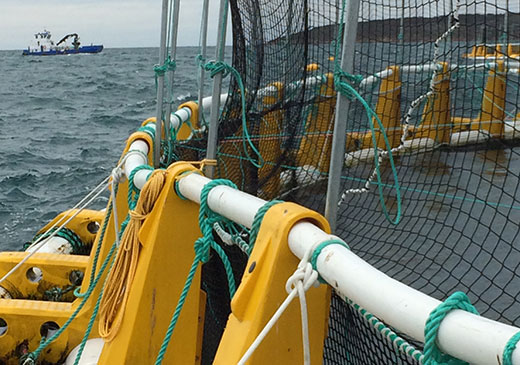Confidence in the future of the Bay of Plenty's aquaculture industry is high after a recent Bay of Connections delegation to Australia's aquaculture capital, Port Lincoln in South Australia.
'Seeing Port Lincoln and how such a humming industry town can develop around aquaculture reinforced that developing (aquaculture in) the likes of Opotiki is not just a pipe dream,” says Graeme Coates, chair of the Bay of Connections Regional Aquaculture Organisation.
Kingfish farming off the coast of Port Lincoln, South Australia may serve as a model for similar ventures in the Bay of Plenty.
Graeme was part of the 18 strong RAO delegation which included representatives from local government, investors and the science sector.
Opotiki is currently home to a developing aquaculture industry, including the development of New Zealand's largest deep water marine farm, with port and harbour developments also planned.
Port Lincoln features world class tuna, mussel, kingfish, oyster and abalone operations, with conditions and species that are similar to the Bay of Plenty, making it the perfect location to see what can be done to develop the region's blue economy.
Graeme says the field trip yielded some extremely valuable information for the Bay of Plenty industry, particularly around mussel processing, kingfish hatcheries and tuna fisheries operations, with the trip also cementing the potential value of the industry for the wider region.
'We went with open minds about what we would learn on the trip and it surpassed all expectations. We saw so many varied operations in a very small geographical area, and learnt that you don't have to be a big operation in the first instance – there is always room for growth.”
Graeme says local government representatives on the trip were encouraged by the overall positivity within the industry and potential for continuing growth. He says it also 'opened a lot of minds” in terms of involving communities and consents processes.
'There was good discussion around the importance of involving the community and reinforced that the way the Bay of Connections is currently doing things in the region in that space is right on track.
'There were also key examples of permitting and planning where differences could be made in the Bay of Plenty, such as considering the likes of oyster farms in estuaries and inlets such as we saw in Port Lincoln. Currently the Bay of Plenty doesn't allow that, but perhaps we need to think about reviewing things to encourage growth.”
Bay of Connections chair Doug Leeder who was also part of the delegation, says Port Lincoln is 20 years ahead in its development of the aquaculture industry.
'This gives us the perfect opportunity to learn a great deal from local operators, including the challenges they face day-to-day, and how we can apply that knowledge to developing the aquaculture industry in the Bay of Plenty.”
The fieldtrip itinerary covered everything from inspiration and innovative speakers, to science and education, environmental management and industry development. The group were warmly welcomed by the region, including a meet and greet hosted by the Port Lincoln mayor, his councillors and industry representatives, with a 90 second story on the New Zealand delegation also featuring on South Australian TV news.



1 comment
Wisechief
Posted on 25-09-2014 14:43 | By Wise Chief
Maybe now the RC/Council might give some support to the long delayed since 1990 100klm long by 2 klm wide floating Mega Reef upon which to grow wild seaweeds. This was the original 1980 reef proposal for deeper waters off BOP Coast which Ngati Awa is now seeking to commandeer with the help of local councils. Such a huge delay because local non indigenous didn't like the thought of the local indigenous building such a large permanent structure in deep ocean. They wanting to keep the world thinking and believing Maori are only capable of doing the Haka and Carving wood and who burn with ire at the prospect of them doing something outside of their permitted limited scope. Seem to forget Maori made large deep water floating reefs out of gourds upon which to fish out at sea over certain spots where species came to the surface.
Leave a Comment
You must be logged in to make a comment.